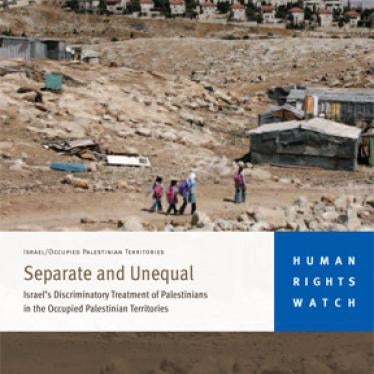(Jerusalem, July 13, 2011) - The Israeli parliament has violated the right to freedom of expression by approving a law that penalizes individuals and organizations that call for boycotting Israeli settlements in the West Bank, Human Rights Watch said today.
The Knesset passed the "Bill for Prevention of Damage to the State of Israel Through Boycott - 2011" by a vote of 47 to 38 late in the evening of July 11, 2011. It was proposed by a member of Prime Minister Binyamin Netanyahu's Likud party. The law threatens lawsuits and damages, and could strip human rights and civil society groups of their tax-exempt status, forcing them to shut down. That would violate their right to freedom of association and expression, Human Rights Watch said.
"Whatever one thinks of boycotts, a law that punishes peaceful advocacy in opposition to government policies is a bald-faced attempt to muzzle public debate," said Sarah Leah Whitson, Middle East director at Human Rights Watch. "This law attacks Israeli civil society and will turn back the clock on freedom of expression and association."
The law penalizes any person or organization that calls for an "economic, cultural or academic" boycott of "a person or other party" because of its "relation" to Israel, Israeli institutions, or "any area under [Israel's] control," a reference to the occupied Palestinian territories. The law defines boycotts to include "undertakings not to purchase products or services produced or provided in the state of Israel, in any of its institutions or in an area under its control."
The law entitles those targeted by boycotts to sue those calling for a boycott for damages, and enables courts to require payments to the aggrieved party "independently of actual damage done." It also permits the government to revoke the tax-exempt status of organizations that call for boycotts and makes public institutions that promote boycotts, including universities, ineligible for various forms of public funding, including for research and development, capital investments, and other support. Bidding on public tenders would be restricted to companies or organizations that do not participate in boycotts.
Several Israeli human rights and civil society groups, including the Israel Committee against House Demolitions and Gush Shalom (Peace Bloc), have advocated boycotts on the basis that settlements are unlawful under the Geneva Conventions. Other groups, including the Coalition of Women for Peace, have responded to calls for "boycott, divestment and sanctions" by conducting and publishing research about companies based in Israeli settlements that assists consumer boycott efforts, which could be interpreted as falling under the bill's definition of publishing calls for boycotts.
In addition to subjecting such groups to the threat of lawsuits and fines, the law could cause them to lose their funding sources. Many such groups depend on foreign - often European - funders, whose regulations in some cases prohibit disbursing grants that would be taxed by other states and contribute to their treasury.
The law could also be applied to Israeli writers, artists, and actors who called on actors not to perform in a cultural center in the Ariel settlement and Israeli professors who called for an academic boycott of the Ariel University Center.
On its face, the law also applies to Palestinian "permanent residents" of East Jerusalem, an area that Israel unilaterally annexed in 1967 but is still considered part of the Occupied Palestinian Territories under international law. In a statement, the Public Committee Against Torture in Israel, Physicians for Human Rights - Israel, Adalah, and the Coalition of Women for Peace pointed to the "absurd result" that "a boycott call by the residents of East Jerusalem against the settlements" would give settlers the right "to demand compensation from victims of the occupation."
Israeli human rights groups have said they will petition the Supreme Court to overturn the law on the basis that it infringes individual freedoms. Among them is the Association for Civil Rights in Israel, which has not taken a position for or against boycotts.
The anti-boycott law is a modified version of a bill introduced in 2010, along with a number of other bills that targeted human rights organizations and civil society groups. A bill sponsored by Ze'ev Elkin, the Likud member who also proposed the anti-boycott law, became law in February. It imposes quarterly rather than annual reporting requirements on nongovernmental groups that receive foreign government funding, which includes human rights groups but not pro-settler groups.
A Human Rights Watch report found that, in West Bank areas under exclusive Israeli control, Israeli policies discriminate against Palestinians in favor of settlements.







